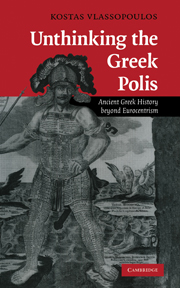PART II - RETHINKING THE CONTEXTS. THE POLIS AS AN ENTITY: A CRITIQUE
Published online by Cambridge University Press: 22 September 2009
Summary
The purpose of the following two chapters is to review and criticise a particular way of approaching ancient history, and history in general. I want to criticise the approach that sees the Greek polis as an entity, and history as a succession or juxtaposition of entities, variously called the West, Greece, Rome, the Orient, antiquity, etc. This will be attempted in a number of case studies. They attempt to criticise some deeply entrenched postulates of social theory and history writing. Charles Tilly has called them ‘the pernicious postulates of twentieth century social thought’, and I reproduce below some that I deem relevant:
‘Society’ is a thing apart; the world as a whole divides into distinct ‘societies’, each having its more or less autonomous culture, government, economy and solidarity.
‘Social change’ is a coherent general phenomenon, explicable en bloc.
The main processes of large-scale social change take distinct societies through a succession of standard stages, each more advanced than the previous stage.
The following chapters attempt to show that all these postulates have indeed pernicious results. Societies are not entities with clear and distinct boundaries. This image results in the dichotomy between internal structure and external influence, leaving perennially unresolved problems. Instead, I will argue that we need to view societies as always parts of wider systems: this will allow us to resolve the dichotomy between internal and external.
- Type
- Chapter
- Information
- Unthinking the Greek PolisAncient Greek History beyond Eurocentrism, pp. 97 - 100Publisher: Cambridge University PressPrint publication year: 2007



